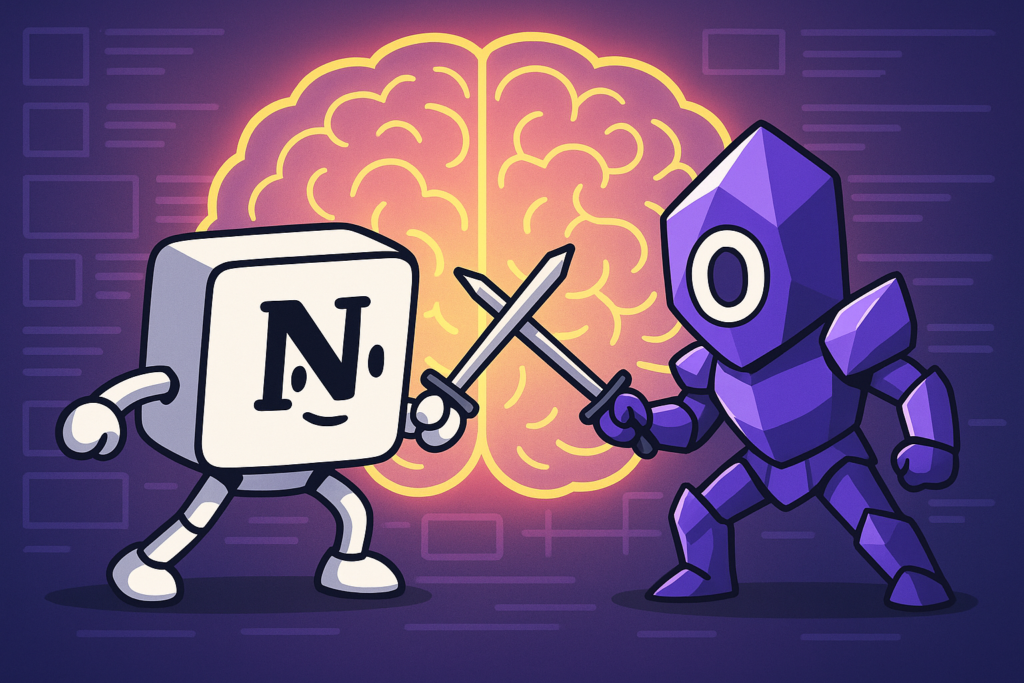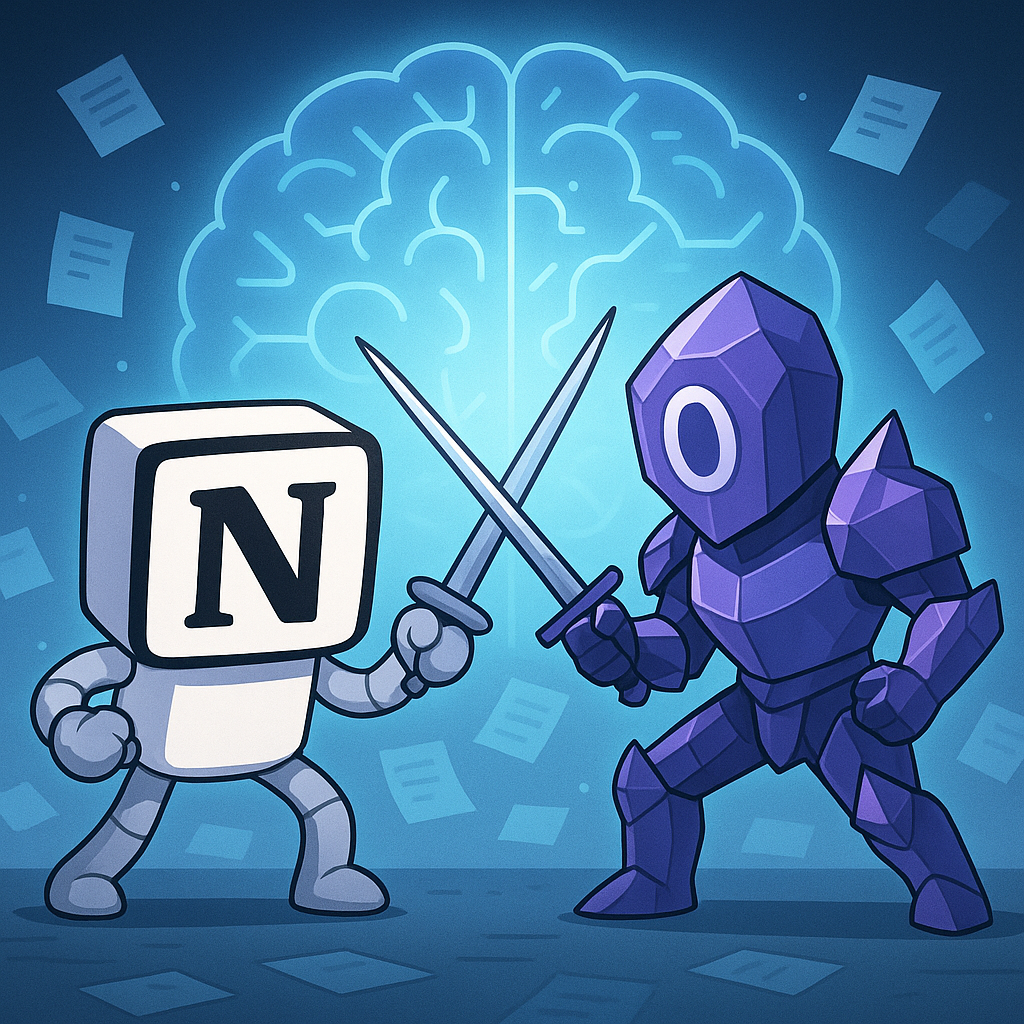Table of Contents
Notion vs. Obsidian
Which Note-Taking App Is Best for Your Brain?
In an age where information isn’t just available but constantly rushing toward us—from academic demands to social feeds—we need systems that act as a second brain to help us filter, store, and retrieve what matters. Choosing the right note-taking app can determine whether your ideas flourish or fade. I’ve spent the last year building a personal knowledge system as a medical student and productivity enthusiast. Along the way, I experimented deeply with both Notion and Obsidian. If you’re curious about how to create your own second brain and why it matters, I’ve written several articles on the topic that you might find helpful.
This isn’t just an app comparison—it’s a look into how these tools reflect different ways of thinking. Let’s explore how they perform across features, use-cases, and mental workflows.
I should mention that I primarily use these tools when studying medicine or working on larger projects. However, for smaller tasks, quick notes, or when I’m reading a book and deeply engaging with a subject, I often prefer the simplicity of pen and paper. There’s something uniquely effective about writing by hand that helps me process and retain information better in those moments.

What Are Notion and Obsidian?
| Feature | Notion | Obsidian |
|---|---|---|
| Core Idea | All-in-one workspace | Local-first linked notes |
| Storage | Cloud-based | Local markdown files |
| Strength | Databases, collaboration | Zettelkasten, bidirectional links |
| Weakness | Speed, offline access | Learning curve, no native sync |
- Notion is like a structured digital notebook where everything is clean, neat, and interconnected via databases and pages.
- Obsidian is like your brain on paper: messy, organic, but infinitely powerful with connections and synthesis.
🧐 Core Philosophies
Notion: Structure First
Notion encourages top-down organization: pages within pages, databases, and highly customized layouts. It’s ideal if you like to see everything categorized.
Obsidian: Connection First
Obsidian mimics the non-linear way the human brain works. Ideas emerge from linking notes rather than organizing them. It’s the tool of choice for thinkers, researchers, and note-making enthusiasts.
⚙️ Feature-by-Feature Comparison
1. Note Creation & Speed
- Notion: Beautiful, but slow. Block-based editor great for polish, less so for fast capture.
- Obsidian: Blazing fast. Minimalist markdown lets you think and type without friction. 🏆 Winner: Obsidian
2. Linking & Idea Connectivity
- Notion: Has backlinks, but they’re secondary.
- Obsidian: Native backlinks, graph view, and seamless linking. 🏆 Winner: Obsidian
3. Databases & Organization
- Notion: Elite-level databases, filters, relations, Kanban, tables.
- Obsidian: Basic folders, but Dataview plugin helps advanced users. 🏆 Winner: Notion
4. Offline Access & Sync
- Notion: Mostly online. Offline mode is limited.
- Obsidian: 100% local. You own your files. Sync via iCloud, Git, or Obsidian Sync. 🏆 Winner: Obsidian
5. Customizability & Plugins
- Notion: Limited to Notion’s features.
- Obsidian: A playground for nerds. Plugins like calendar, mind map, Anki. 🏆 Winner: Obsidian
6. Collaboration & Sharing
- Notion: Top-tier for teams, shared projects, publishing online.
- Obsidian: Not built for sharing. Mostly solo.
Winner: Notion
Who Should Use What?
🧠 Use Obsidian if you:
- Love to link ideas and think deeply
- Prefer working offline and owning your data
- Want to build a Zettelkasten or Second Brain
Additionally, Obsidian can be used offline for free, but if you prefer syncing your notes across devices and collaborating with others, there’s an optional subscription for its online syncing feature.
📊 Use Notion if you:
- Need structured project or life management
- Work in teams or need collaboration
- Want clean, organized dashboards
Can You Use Both?
Absolutely. Many creators and students (myself included) use:
- Obsidian for raw thoughts, atomic notes, and idea development
- Notion for planning, projects, and publishing
Together, they complement each other perfectly.
🏁 Final Decision
Your note-taking app should reflect the way your mind works. Obsidian is ideal for non-linear thinkers who want raw power. Notion is perfect for structured organizers and sharers.
Indeed, I currently use both apps, but for different purposes. For example, when I need to organize my lecture notes for the semester and track how many times I’ve studied a particular topic or assess my proficiency in that subject, I turn to Notion because of its powerful and customizable database features. However, when I’m taking notes and gathering information on a subject I’m learning, especially when linking information is crucial for deeper understanding, I use Obsidian.
Start with one. Grow into the other if needed. In the end, it’s not about the tool—it’s about your ideas.
Let me know in the comments: What tool are you currently using, and why?




What are the key differences between Notion and Obsidian as knowledge management tools, and how can building a personalized “second brain” system enhance productivity and learning—especially for students or professionals managing large amounts of information?
Regard IT Telkom
That’s a very good question. Students or Professionals mostly dealing with tons of information and notes’ that’s where these notetaking apps come and do the hard job as remembering where which note is and how can they be connected together to better productivity.
Foarte interesant articolul! Mulțumim pentru informații.
Simply wish to say your article is as amazing. The clarity in your post is just great and i could assume you are an expert on this subject. Fine with your permission allow me to grab your feed to keep up to date with forthcoming post. Thanks a million and please keep up the gratifying work.
I am impressed with this site, really I am a fan.